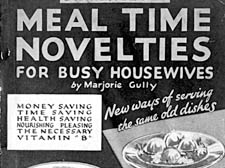|
|
 |
| |

Illustration from hard times in Hunter Davies’ Cold Meat and How to Disguise It |
Even the bad times were good
As days of austerity make a comeback, Hunter Davies tells Gerald Isaaman how
previous generations made the most of it
Cold Meat And How to Disguise It: A History of Advice on How to Survive Hard Times.
By Hunter Davies
IF you want an antidote for the grim budget, then this is it.
Hunter Davies’s austerity anthology – Cold Meat And How to Disguise It: A History of Advice on How to Survive Hard Times – is packed with fun and delight, tips and advice that ought to lift depressed spirits.
Remarkably, its birth originates in a childhood mania that began with him hoarding stamps and football cards and has resulted in him creating some 20 collections of memorabilia, from the Beatles, now in the British Library, to the Suffragettes.
As a prolific journalist and author of more than 30 books, another priority for collection have been newspapers and magazines (including the very first editions of our major national newspapers), along with obscure magazines, brochures, pamphlets and books galore packed with illustrations.
Indeed, they include the original Cold Meat And How to Disguise It, published in 1904, along with Samuel Smiles’ classic Thrift from 1879. “So my book is a perfect example of recycling,” he told me at his home in Kentish Town.
All the more so, as he points out, because we have been through economic downturn crises before, wars and general strikes included, and need to learn from – and laugh at – advice on how to survive hard times.
My favourites include the Make Do and Mend entreaty over corsets. “Now that rubber is so scarce, your corset is one of your most precious possessions,” it implored ladies in 1943.
“Be sure first of all that it fits. In particular don’t wear one too small, as this stretches the rubber and puts too much strain on it…”
Then there’s the Ministry of Supply advert telling you to save bones because they do, believe it or not, make good fertilisers, and the hilarious Private Eye suggestion to “Save on hot water by taking your washing into the bath and doing it there.”
There is, however, one significant difference between the past and the 21st century, given that wasting food was a criminal offence during the Second World War. “Samuel Smiles believed waste was wicked,” says Hunter. “And there was a serious religious and moral undertone to what he wrote. But today there is no hellfire. In these godless times, threatening hell and brimstone, moral purgatory, going to the devil carries no weight whatsoever.
“So my book lets you see things in perspective, allows you to see all those old wisdoms when these awful financial cycles have happened time and again before, though we do now have this element of environmental righteousness, and incentives for people to do their bit recycling.”
That is certainly true when food prices last year rocketed in some cases by 40 per cent, petrol costs went sky high and we live with the problems of obesity from eating so much junk food and drinking too much cheap booze. So there is good reason to tighten your belt.
While Hunter’s Sunday newspaper column warned of the inevitable property crash – “When we bought a house in 1964 we had to put a third down and allowed a mortgage only three times our salary compared with the madness of giving mortgages of 125 per cent to people who had no money,” he recalls – the banking failure was beyond his realm.
He lost faith in stocks and shares when his Equitable Life pension disintegrated. “I bought it because the people who came round had such lovely suits, came from a company that went back centuries and had all these lords and bishops on its books,” he admits.
He supports the government’s plan for a 50 per cent income tax level for the rich, but, like most people, the politicians in particular, has no real clue how to solve the dire situation.
His own background was a wartime one, so austerity is nothing new to him.
“My mum gave me mashed parsnips and said they tasted like bananas, which of course I’d never had or seen,” he remembers. “After the war, when I tasted my first bananas, I much preferred parsnips. And during the war, everyone was the same, the posh and the council tenants all living on rations, so you didn’t feel deprived – you felt normal.”
The basic tenets of a secure economic life were indeed laid down by Samuel Smiles. Anyone occupying No10 or the Bank of England ought to abide by them. His four golden rules were: spend less than you earn; pay ready money and never run into debt; never anticipate uncertain profits by expending them before they are secured; and keep a regular account of all that you earn.
Seems to make sense to ordinary folk.
•
|
 |
|
 |
 |
|
 |
|


